⚡ZurzAI.com⚡
Companies Similar to Artera
Akara
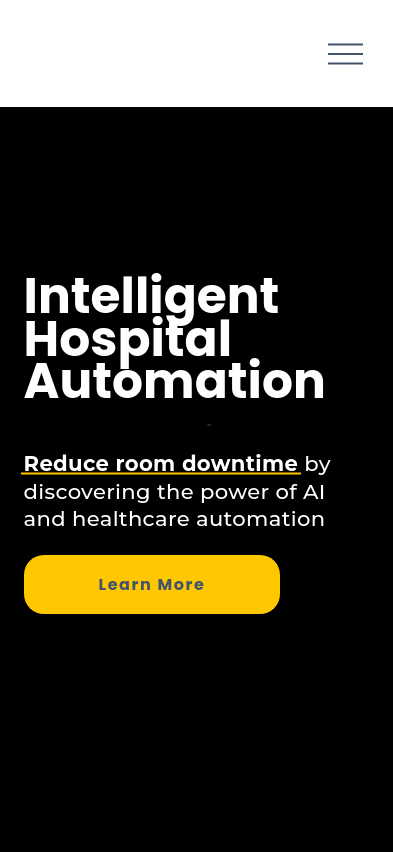
Akara is an Irish healthcare automation company that uses AI-powered systems to improve operational efficiency in medical facilities with assistive robots and room sensors.
Akara Robotics Overview
Key Focus Area: Akara Robotics is heavily focused on advancing healthcare automation through robotics and artificial intelligence. Their commitment is to improve public health by increasing the efficiency of healthcare facilities, primarily through their disinfection robots and intelligent automation systems. Their pioneering work in healthcare robotics aims to tackle crucial issues like hospital infections and operational downtimes.
Unique Value Proposition and Strategic Advantage:
- Robotics & AI Integration: Akara’s core value lies in its integration of advanced robotics and AI to provide efficient cleaning and disinfection services within healthcare facilities. Their technology promises reduced room downtimes and more efficient use of resources, which directly addresses the needs for enhanced protocol efficacy in medical environments.
- Collaborative Development: Their development process is marked by collaboration with healthcare professionals to ensure the integration of technology enhances operational workflows without compromising safety or quality.
- Recognition and Awards: Akara's innovations have been acknowledged globally with multiple accolades including features in TIME Magazine and recognition by the European Commission, which amplifies their reputation and visibility in the healthcare technology sector.
Delivery on Their Value Proposition:
- AI-Powered Disinfection Robots: The flagship offering includes autonomous disinfection robots that significantly reduce environmental contamination through rapid terminal disinfection, thereby reducing staffing requirements and biocide use. These robots can complete cleaning tasks more swiftly compared to traditional methods, facilitating increased room turnovers.
- Intelligent Workflow Tools: Akara offers digital applications designed to manage healthcare workflows more efficiently. These tools streamline cleaning operations by providing real-time monitoring, automatic task management, and data-driven decision support, ensuring regulatory compliance and optimal use of staffing.
- Strategic Partnerships: They have strategically partnered with multiple healthcare providers, including the NHS and hospitals across Europe, to conduct pilot projects and trials, which have demonstrated substantial efficiency gains and service capacity enhancements.
- Research & Development: Akara continues to expand their technological capabilities through consistent research and partnering globally for innovation in healthcare robotics, ensuring their products remain cutting-edge and relevant.
Through these strategies, Akara Robotics aims to redefine the disinfection protocols and operational capabilities within the healthcare sector, promising efficiency gains while maintaining high standards of safety and cleanliness. Their efforts reflect a deep integration of technology with practical healthcare applications, setting a benchmark for concurrent innovations in the field.
Qure.AI
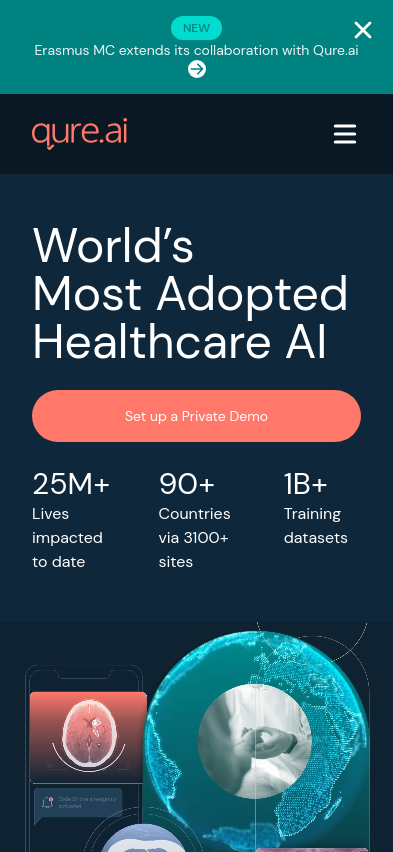
A healthcare AI company that simplifies radiology workflows and enhances diagnostic capabilities through AI automation.
Qure.ai is focusing on using artificial intelligence (AI) to improve healthcare outcomes globally by collaborating with various organizations and expanding its product use in diverse medical scenarios. Here are the main highlights as presented in the content:
Key Partnerships and AI Integration:
-
Erasmus MC Collaboration: The company has extended its partnership with Erasmus MC to enhance its healthcare AI applications.
-
Global Reach and Impact: Qure.ai emphasizes its global adoption, impacting over 25 million lives in more than 90 countries with AI-driven healthcare solutions.
-
Significant Partnerships:
- AstraZeneca Partnership: Joint efforts are underway to screen 5 million patients by 2025 as part of the EDISON Alliance’s 1 Billion Lives Challenge. This aims to improve access to healthcare through scalable digital solutions.
- Medtronic India Collaboration: Qure.ai supports faster diagnosis and treatment of stroke in India, enhancing efficiency by streamlining data sharing.
- Merck Global Health Innovation Fund: Positive assessments of AI's potential in early diagnosis of diseases such as lung cancer and tuberculosis.
-
Public Health and Disease Management: AI solutions are designed to assist clinicians in diagnosing diseases like tuberculosis, stroke, and lung cancer, as well as ensuring timely intervention.
-
WHO Evaluated Solutions: These are provided for global disease management, focusing on tuberculosis and real-time disease surveillance.
AI-Driven Product Offerings:
- Lung Cancer Care Continuum: Helps in the early detection of lung nodules and disease management.
- Stroke Care Coordination Suite: Designed to facilitate patient triage and enhance communication within clinical networks for stroke interventions.
- Tuberculosis Screening: The integration with existing X-ray systems allows for faster screenings and results, aiding in tuberculosis management in regions like Lesotho.
Expansion and Leadership:
- New Executive Appointments: A USA-based Chief Commercial Officer has been appointed to drive global expansion.
Testimonials and Global Impact:
-
Diverse Acknowledgments: Testimonials from various medical and technical leaders endorse the effectiveness of Qure.ai's AI solutions in enhancing diagnostics, resource utilization, and patient care logistics.
-
Real-World Applications: The AI technology fits different medical machines and systems, supporting healthcare establishments in resource-constrained environments.
-Innovative Efforts in Pediatric Care: Special attention is given to including children in healthcare screenings using digital platforms.
In summary, Qure.ai is focused on leveraging AI to bridge healthcare gaps by enhancing diagnostic capabilities and treatment processes globally, with notable partnerships and applications aimed at providing scalable solutions across different medical specialties and under-resourced environments.
Avicenna.AI

Avicenna.AI specializes in artificial intelligence solutions for medical imaging applications, focusing on radiology.
Avicenna.AI, established in 2018 through a collaboration between Cyril Di Grandi and Dr. Peter Chang, focuses on creating artificial intelligence solutions aimed at enhancing radiology practice, particularly in emergency and incidental findings on CT scans. Their technology aims to automate repetitive tasks in radiology, thus allowing medical professionals to devote more time to critical cases and facilitating more rapid and precise diagnoses.
Core Products and Solutions:
-
CINA-ICH: Targets intracranial hemorrhage detection on non-contrast CT scans, aiming to reduce turnaround times for detecting head trauma injuries and hemorrhagic strokes.
-
CINA-LVO: Focuses on detecting large vessel occlusions, a primary cause of ischemic strokes. This tool is prioritized on radiologist worklists for more urgent responses.
-
CINA-ASPECTS: An AI-based tool that quantifies strokes using the ASPECT score, providing fast, consistent assessment and aiding in the evaluation and treatment of ischemic strokes.
-
CINA-PE and CINA-iPE: These tools detect pulmonary embolisms, including incidental findings during chest CT scans, responding to the complexity of diagnosing pulmonary embolism.
-
CINA-AD: Detects aortic dissection, a severe cardiovascular issue, ensuring patients receive urgent medical intervention.
-
CINA-VCF and CINA-CSpine: Detect vertebral compression fractures and cervical spine fractures on CT scans, enabling early intervention and improving patient management.
Value Proposition:
- Reduced Interpretation Time: AI tools are designed to quickly detect diseases, delivering precise results and allowing healthcare workers to intervene promptly.
- Optimized Patient Management: Healthcare providers can streamline and prioritize patient workflows, effectively managing resources and improving patient outcomes.
- Enhanced Radiology Workflow: By handling routine tasks, AI solutions allow radiologists to manage greater workloads, reducing case turnaround times and increasing productivity.
Milestones and Developments: Since its inception, Avicenna.AI has made significant strides in securing funding, launching several AI-powered products for radiology, and obtaining necessary regulatory clearances including FDA approvals and CE markings for various solutions. As of 2023, the company has secured nearly $10 million in Series A funding.
Academic and Clinical Contributions: Avicenna.AI emphasizes the validation of their solutions through clinical studies and publications, proving the efficacy and accuracy of their AI tools in real-world scenarios. Their research is presented in various scientific journals and conferences.
Global Presence and Collaborations: The company partners with various healthcare and AI technology providers to enhance the reach and implementation of their solutions across hospitals and countries, focusing on collaboration as a key strategy to extend their AI solutions to a global audience.
Overall, Avicenna.AI aims to revolutionize radiology with AI-driven tools that expedite and enhance the diagnostic process, ensuring timely patient care and improving healthcare delivery efficiency across the globe.
VIDA Lung AI
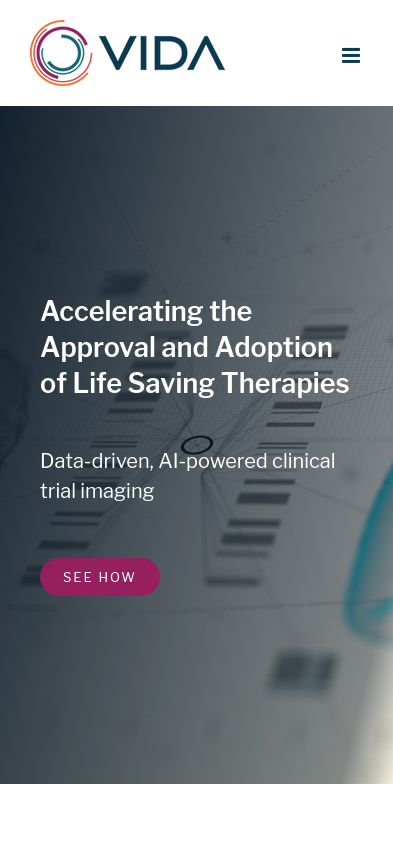
VIDA Lung AI provides data-driven, AI-powered clinical trial imaging services. Their platform enables exceptional imaging data quality and efficient site operations, offering services such as image analysis and site management to support drug development and clinical trials.
VIDA, a clinical imaging intelligence company, focuses on streamlining the drug development and clinical trial process using AI-powered digital biomarker solutions. Key offerings include the VIDA Intelligence Platform, which facilitates high-quality imaging data from over 1,500 global sites, helping biopharma sponsors save millions in drug development costs.
Main Services:
- Clinical Trial Imaging: The platform supports the drug development process by providing exceptional imaging data quality and efficient site operations, using AI-powered algorithms for producing quantitative imaging biomarkers.
- Site Management and Trial Workflow: Includes digital onboarding, scanner certification, and ongoing proactive site support throughout trials. This is coupled with trial workflow design strategies.
- Sponsor Trial Orchestration: Offers sponsors access to trial imaging data, key performance metrics, and site activity.
Features:
- AI-powered Digital Biomarkers: Utilized in all therapeutic areas, from respiratory diseases to cardiovascular and oncology trials, VIDAs imaging biomarkers help in disease phenotyping and discovering new digital biomarkers.
- Digital Biobank: Functions like a traditional biobank but for digital patient information, aiding research purposes by revealing data patterns among cohorts, simulating control arms, and creating digital twins.
Therapeutic Areas:
VIDA serves multiple therapeutic areas, expanding its AI-powered imaging biomarkers across:
- Respiratory Diseases: Including COPD, asthma, and interstitial lung diseases, VIDA delivers extensive metrics to evaluate lung function and structure.
- Cardiovascular Conditions: Measures such as the Coronary Artery Calcium Score (CACS) and Pulmonary Artery size help assess conditions like coronary artery disease and pulmonary embolism.
- Oncology, Neurology, Musculoskeletal, and Gastroenterology Trials: Each area benefits from specialized quantitative imaging and biomarker capabilities.
Partnerships and Platforms:
VIDA collaborates with Polarean for advanced MRI solutions and RAYUS Radiology for decentralized clinical trials, integrating AI analysis across various modalities and therapeutics.
Data Security and Compliance:
Ensuring data privacy and security, VIDA complies with HIPAA standards and ISO certifications, using AES256-bit encryption to protect patient information.
Leadership and Growth:
The company is led by experienced professionals like CEO Dr. Susan Wood, and continues to gain recognition and grow with strategic partnerships. Recent appointments and market expansions, including entry into Japan with Clairvo, underscore committed growth.
Webinars and Educational Resources:
VIDA presents regular webinars featuring experts on topics such as COPD studies and digital biomarkers in clinical trials, aiming to educate and inform the clinical research community.
VIDA's offerings aim to modernize and enhance the efficiency of clinical trials, supporting pharmaceutical innovators in drug development processes while maintaining strict compliance with data privacy regulations.
Arya AI
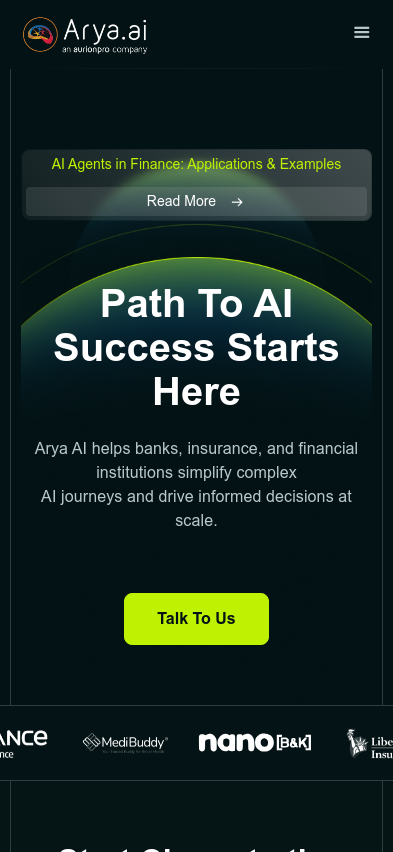
Arya AI provides advanced AI solutions to streamline and automate credit risk assessment and various aspects of financial operations, enhancing precision and speed.
Arya.ai is a technology platform offering a range of AI-driven solutions, primarily aimed at improving financial operations for banks, insurance companies, and other financial institutions. Here's a breakdown of their main offerings and solutions:
Product Lineup:
-
Apex: An AI-powered API library designed to streamline workflows through over 100+ AI APIs. These APIs facilitate automating tasks such as customer verification, document fraud detection, invoice extraction, KYC data processing, and more. It offers a low code solution for easy integration into existing systems.
-
Nexus: A secure and scalable API gateway that optimizes, secures, and governs APIs with high performance and ease. The gateway provides sophisticated traffic management, reliability, and compliance measures for managing APIs efficiently. Nexus aims to streamline large-scale integrations.
-
AryaXAI: A machine learning observability platform that assists in explaining, observing, and aligning mission-critical AI applications. This platform ensures AI models are performing in line with business needs and regulatory requirements.
Key Solutions:
-
AI Cashflow Forecasting: Automates cashflow forecasting, reducing manual labor and improving accuracy by consolidating vast sets of financial data and optimizing predictive models.
-
Intelligent Document Processing (IDP): Uses AI, OCR, and NLP to process documents more efficiently and accurately, significantly reducing manual work and errors associated with document management.
-
AI Onboarding: Streamlines onboarding processes by automating identity verification, fraud detection, and compliance checks, resulting in reduced drop-off rates and improved customer experience.
Applications in Finance:
-
Banking: From cash flow analysis to transaction anomaly detection, Arya.ai leverages AI to enhance security, streamline operations, and improve customer experiences in the banking sector.
-
Insurance: Arya’s technology supports automation in underwriting, claims processing, risk assessments, and fraud management, thereby enhancing process efficiency and service offerings in the insurance sector.
-
Lending: AI models assess risk, detect fraud, and help personalize loan offerings, which can help streamline lending processes and enhance credit assessments.
Customer Experiences:
- Companies like Tata AIG, ICICI Lombard, and Axis Bank have utilized Arya’s API solutions to streamline operations such as KYC processes, onboarding, document classification, and fraud reduction. Users have reportedly experienced heightened process efficiency and significant reductions in operational costs and time.
Compliance and Security:
- Arya.ai emphasizes compliance with global regulations such as GDPR and ISO 27001. Their systems are designed to handle sensitive data securely with end-to-end encryption and robust privacy controls.
AI in Practice:
-
AI Agents: Arya’s AI agents perform a wide variety of tasks ranging from operational to strategic decisions using large language models and other advanced AI techniques to mimic complex human decision-making processes.
-
Real-time Services: Arya provides insights and analytics in real-time through various APIs, aiding in quick decision-making and fraud prevention.
The emphasis across Arya.ai's product line is on enhancing efficiency, reducing manual errors, and providing robust security, particularly aimed at financial institutions looking to leverage AI for better operational results and customer service.
Acerta
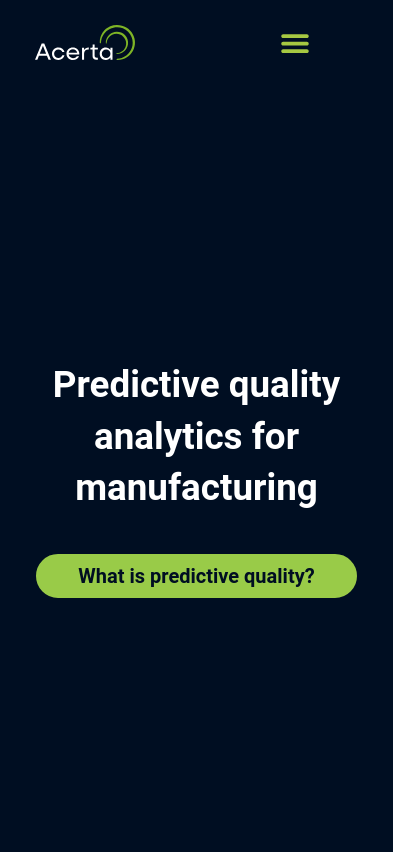
Acerta provides AI-driven manufacturing solutions, specializing in predictive quality analytics and predictive maintenance for automotive manufacturers.
Careers | About | Leadership | About | Management | About | About | News | News | About | About | About | About | About | About | About | About | About | About | About | About | About | About | About | About | About | About | About | About | Leadership
Company's Key Focus Area: Acerta's primary focus is on developing software solutions that leverage machine learning to enhance predictive quality analytics in the manufacturing sector. This includes improving quality, reducing scrap rates, and efficiently performing root cause analysis within the automotive manufacturing domain.
Unique Value Proposition and Strategic Advantage: Acerta's unique value proposition lies in its flagship product, LinePulse, which is designed to ingest and analyze manufacturing data in real-time, directly from the shop floor. This platform provides predictive insights, which help in the early detection of potential defects and the rapid diagnosis of root causes for manufacturing issues. The strategic advantage is the application of advanced machine learning algorithms tailored specifically for the complexities of automotive manufacturing, facilitating a significant reduction in both failure rates and warranty costs for manufacturers.
Delivery on Value Proposition:
-
Real-Time Data Analysis:
- LinePulse utilizes machine learning and cloud computing to process manufacturing data in real-time, enabling quick decision-making on the production floor.
- It enhances data visibility across production lines, providing consistent updates and insights through user-friendly dashboards.
-
Automated Root Cause Analysis:
- By comparing test data with upstream manufacturing signals, LinePulse can identify and list potential causes for defects much more swiftly than traditional methods.
- This allows engineers to undertake targeted investigations, saving time and operational costs.
-
Predictive Alerts and Anomaly Detection:
- LinePulse employs anomaly detection to monitor data parameters closely, alerting users to deviations indicative of a potential fault before they cause significant production disruptions.
- These predictive alerts allow for proactive measures, curbing defects early in the process.
-
Cloud-Based Solutions:
- The platform's cloud-based architecture ensures that data can be efficiently stored, processed, and shared across different manufacturing sites securely and swiftly.
- This ensures scalability and ease of deployment across global manufacturing operations.
-
Professional Services and Custom Solutions:
- Acerta's Professional Services team offers bespoke ML and data analytics solutions for unique manufacturing problems, extending beyond the capabilities of LinePulse.
- This customization is enhanced by Acerta's domain expertise in automotive engineering, providing tailored analytics solutions that address specific client challenges and drive operational efficiencies.
By integrating these capabilities, Acerta aims to transform the traditional quality control methodologies in manufacturing into predictive systems that ensure higher product quality and improved productivity.
Genesis Therapeutics

Genesis Therapeutics develops an AI platform for small-molecule drug discovery using 3D modeling and molecular simulations.
Genesis Therapeutics is centered around integrating artificial intelligence into drug discovery to significantly enhance the efficacy and speed of developing novel therapeutics. The company leverages advanced machine learning techniques to revolutionize the drug discovery pipeline, thereby positioning itself at the confluence of technology and pharmaceuticals.
Key Focus Area:
Genesis Therapeutics concentrates predominantly on the application of artificial intelligence to facilitate and expedite drug discovery and development. By employing cutting-edge AI methodologies, the company aims to address and overcome traditional challenges within this domain, realizing more efficient pathways for identifying viable drug candidates.
Unique Value Proposition and Strategic Advantage:
-
Proprietary AI Platform: The core unique proposition of Genesis Therapeutics is its proprietary AI platform designed to handle the intricacies of molecular simulation and prediction. The platform aims to enhance the identification accuracy of potential therapeutics and accelerate the drug development timeline from discovery to clinical deployment.
-
Innovation in Drug Discovery: What sets Genesis Therapeutics apart is its targeted use of machine learning to not only predict molecular behavior but also optimize therapeutic molecules. This capability allows them to address unmet medical needs with more precision and fewer resources compared to traditional methodologies.
-
Experienced Team and Network: The company boasts a team with deep expertise in AI, computational biology, and chemistry. Additionally, Genesis Therapeutics has established strategic collaborations and partnerships, expanding its influence and integrating innovations across the pharmaceutical landscape.
Delivery on Value Proposition:
-
AI-driven Therapeutic Development: At the heart of Genesis Therapeutics are its machine learning algorithms tailored to maximize the potential of drug discovery initiatives. These tools are designed to manage large datasets and complex biological systems, identifying novel compounds that may have been missed through conventional research methods.
-
Effective Pipeline Management: Genesis Therapeutics is continuously enhancing its pipeline, focusing on developing therapeutics across various disease areas. The emphasis is on ensuring that the data-driven approach provides reliable predictions and insights that drive forward the synthesis and testing of promising compounds.
-
Collaborative Ecosystem: The company's strategic partnerships with academic institutions and pharmaceutical firms allow for the sharing of knowledge and resources, thereby broadening the scope and impact of their research endeavors. These collaborations aim to leverage joint expertise to explore and validate new drug hypotheses.
Genesis Therapeutics is poised to redefine the drug discovery paradigm through its integrated AI-enhanced solutions. While company-authored content underscores its differentiation by emphasizing innovative capabilities and strategic partnerships, the true measure of impact lies in its ability to deliver clinically beneficial therapeutic outcomes through its proprietary platform and collaborations.
MSK.ai

MSK.ai caters to the orthopaedic community, offering a patient app and services to optimize care pathways and improve surgery outcomes through data-driven insights.
MSK.AI Company Overview
1) Key Focus Area
MSK.AI is centered on the delivery and enhancement of musculoskeletal (MSK) care. It emphasizes the integration of healthcare technology solutions with a particular focus on remote therapeutic monitoring (RTM), patient engagement, and advanced analytics.
2) Unique Value Proposition and Strategic Advantage
MSK.AI's distinctive value proposition lies in its comprehensive technology platform designed to optimize MSK care for physicians, health systems, and health plans. The strategic advantage is built upon:
-
Wide Spectrum of Support: Utilizes RTM and various pathways to address over 1,000 MSK conditions, ranging from rehabilitation to surgical interventions.
-
Billing and Reporting Expertise: Offers expertise in RTM with detailed guidance on deploying and billing programs, and achieving compliance with mandates like the CMS-mandated patient-reported outcome (PRO) reporting.
-
Tailored Solutions: Pledges tailored solutions that cater to the diverse needs of practices, health systems, and organizations of varying sizes.
3) Delivering on Their Value Proposition
MSK.AI strives to fulfill its value proposition through a multi-faceted approach:
-
Technology-Driven Patient Engagement: The platform enhances patient-provider interactions through personalized patient engagement strategies and educational modules. This aims to elevate the overall patient experience while reducing the clinical workload.
-
Advanced Data Analytics: Employs robust analytics features to support clinical, financial, and operational improvements. This includes tracking vital KPIs, better managing surgical operations, and enhancing operational efficiencies.
-
Remote Therapeutic Monitoring: Innovates remote care delivery by integrating RTM programs for MSK patients, enabling health providers to deploy pathways and improve outcomes cost-effectively.
-
Support for Value-Based Care: Aligns with the CMS Framework for Health Equity to advance health equality. It supports scalable solutions for clinicians and networks engaging in value-based care, thus ensuring outcomes improvement at scale.
Overall, MSK.AI offers a broad array of technology solutions aimed at transforming how MSK care is managed and delivered, focusing on efficiency, compliance, and patient engagement. These efforts are especially relevant in a healthcare environment that increasingly values data-driven insights and enhanced remote care solutions.
Peer AI

Peer AI provides healthcare-oriented AI solutions, including the automation of clinical trial patient narrative summaries, helping streamline lengthy report creation.
Peer AI primarily focuses on enhancing internal operational efficiency and communication for businesses through its advanced artificial intelligence solutions. The company emphasizes the importance of seamless collaboration and aims to enable organizations to leverage AI in optimizing operational processes, enhancing productivity, and reducing costs associated with inefficient workflows.
Their unique value proposition lies in delivering AI-powered tools that integrate smoothly into existing corporate infrastructures. Peer AI aims to address the common challenges faced by organizations, such as communication silos, data management inefficiencies, and the high costs of enterprise software. The strategic advantage centers around the company's ability to offer customizable AI solutions that adapt to specific business needs, providing flexibility and scalability as organizations grow.
To deliver on this value proposition, Peer AI employs the following strategies:
-
Integration Capabilities: Their solutions are designed to work seamlessly with existing software platforms, minimizing transition time and reducing the need for extensive retraining of employees.
-
Customization: Peer AI tailors its AI models to suit the specific requirements of various industries, ensuring the tools provided are relevant and impactful for each unique business environment.
-
Scalability: As businesses expand, Peer AI ensures that its technology scales along with them, offering both small-scale and enterprise-level solutions that can adapt to growth without compromising performance.
-
Efficiency Benefits: By focusing on reducing redundancy and streamlining communication within an organization, Peer AI positions itself as an enabler of significant cost savings in terms of both time and resources.
-
User-Centric Design: Their products are built with an emphasis on ease of use, ensuring that they cater to a broad user base, ranging from IT specialists to everyday users across various departments.
Overall, Peer AI positions itself as a company that helps businesses address internal inefficiencies by offering an adaptable suite of AI tools that prioritize integration, customization, scalability, and user accessibility. This aligns with their mission to empower organizations to optimize their workflows efficiently and effectively.
Axelera AI

Axelera AI specializes in AI acceleration for edge computing applications, with a platform called Metis for handling computer vision inference.
Axelera AI is primarily focused on delivering high-performance AI hardware acceleration solutions designed for edge computing. Their key focus areas include generative AI, computer vision inference, and making AI accessible and efficient across various markets, including security, retail, industrial, and automotive sectors.
Unique Value Proposition and Strategic Advantage:
-
AI Acceleration Hardware: Axelera AI's Metis platform, including AI Processing Units (AIPUs) and acceleration cards like PCIe and M.2, claims to deliver unprecedented performance with high throughput and low energy consumption.
-
Integrated Hardware and Software Solutions: The company's offer encompasses hardware paired with an easy-to-use software stack, the Voyager SDK, which simplifies the deployment of AI models. This combined offering emphasizes usability, power efficiency, and cost-effectiveness.
-
Digital In-Memory Computing Technology: Axelera AI prides itself on using Digital In-Memory Computing (D-IMC) and RISC-V dataflow architectures. This technology minimizes data movement between memory and compute units, supposedly overcoming traditional memory bandwidth constraints and power inefficiencies.
-
Partnership and Ecosystem: Collaborations with companies like Arduino aim to enhance the accessibility of AI at the edge. By leveraging Arduino’s open-source community and Axelera’s hardware acceleration, the partnership aims to democratize AI innovations for a broader audience.
Delivery on Value Proposition:
-
Product Offerings: The Metis Compute Board and Accelerator Cards provide comprehensive solutions for AI inference at the edge. These products aim to bridge the gap between cutting-edge AI technology and practical implementation by offering ready-to-deploy systems that require minimal additional development from users.
-
Cost and Power Efficiency: Axelera’s technology is touted as being significantly more energy-efficient and cost-effective compared to traditional AI solutions like GPUs. This is achieved through their specialized architecture and quantization techniques that enhance output without compromising accuracy.
-
Flexible and Scalable Platform: Through the Metis evaluation systems, Axelera AI caters to a wide array of applications, including video analytics and quality inspection, capable of handling multiple high-resolution video streams simultaneously. The scalability of the platform allows it to integrate seamlessly with existing systems, enhancing its practicality and future-proofing capabilities.
-
Strategic Geographic and Market Expansion: With significant investment backing, Axelera AI plans to broaden its market reach into North America, Europe, and the Middle East. This expansion strategy aims to support the growing demand for efficient AI solutions and support computing needs across various new application domains including automotive and digital health.
-
Client Engagement and Community Building: Through events, partnerships, and an online store, Axelera AI encourages engagement, offering personalized demonstrations of their technology to drive client and community uptake.
Axelera AI is positioning itself as a key player in the edge AI space, focusing on hardware that claims to deliver high efficiency and performance while addressing cost and power consumption challenges. Their strategic partnerships and planned expansions underscore a commitment to evolving with market demands and enhancing AI accessibility globally.
Axelera

Axelera is working to develop AI acceleration cards and systems for use cases like security, retail and robotics.
Key Focus Area
Axelera AI is dedicated to advancing AI technologies with a focus on edge computing solutions. Their primary industry application is in accelerating inferencing for computer vision tasks within edge devices. They aim to enable efficient, cost-effective, and high-performance AI solutions specifically tailored for applications in the security, retail, and industrial sectors, among others. This approach allows users to process data insights rapidly and efficiently without the constraints typically associated with traditional cloud-based AI systems.
Unique Value Proposition and Strategic Advantage
Axelera AI's distinctive advantage lies in their development of a comprehensive hardware and software ecosystem, specifically designed for edge AI applications. The heart of their offering is the Metis AI Processing Unit (AIPU) which utilizes proprietary Digital In-memory Computing (D-IMC) technology in conjunction with RISC-V architecture. This combination promises to deliver:
- High Performance and Efficiency: The Metis AIPU can achieve up to 214 TOPS, offering significant computational power while maintaining energy efficiency.
- Cost Effectiveness: By utilizing D-IMC and standard CMOS technologies, Axelera's solutions aim to be more cost-effective than traditional GPU-based alternatives.
- Scalability: Their hardware can be scaled and integrated into existing systems using familiar interfaces like PCIe and M.2, which facilitates ease of deployment and future-proofing for users.
Delivering on Value Proposition
Axelera AI fulfills its pledge to provide cutting-edge AI acceleration through several initiatives:
-
Technological Innovation: Their Metis AIPU and the accompanying Voyager SDK offer an integrated hardware-software solution that simplifies deploying AI models on edge devices. The D-IMC technology ensures high computational efficiency while reducing power consumption.
-
Ecosystem Partnerships: Collaborations with established platforms such as Arduino expand the accessibility and applicability of their AI solutions. These partnerships aim to integrate high-performance AI capabilities into a broader range of devices and applications.
-
Product Offerings: Axelera provides hardware options, including evaluation kits and AI acceleration cards, that simplify the integration of AI into existing infrastructure, thus reducing both time-to-market and operational costs for end users.
-
Application Versatility: Their solutions are suitable for multiple applications such as multi-channel video analytics, safety monitoring, and real-time operational intelligence, enabling a diverse range of industries to leverage AI efficiently.
-
Sustainability Focus: Axelera AI promotes running high-performance AI applications on-device, reducing dependency on power-intensive cloud solutions and contributing to lower carbon emissions.
In sum, Axelera AI strategically positions itself to accelerate AI innovation, empowering industries to deploy efficient edge AI applications with reduced cost and energy consumption while maintaining significant computational capability.
Adversa

Adversa automates red teaming activities, enhancing organizations' abilities to assess their security guardrails' robustness against AI model threats.
About | News | About | About | About | About | About | Management | About | About | About | About | About | About | About | About | About | News | About | About
Adversa AI, an Israeli AI startup, focuses on securing artificial intelligence primarily through the protection of AI systems from cyber threats, privacy issues, and safety risks. Their key focus revolves around providing security solutions for AI to various industries such as finance, insurance, automotive, biometrics, and more. By identifying and managing the myriad of AI risks specific to different sectors, Adversa seeks to create more secure and trustworthy AI environments.
Unique Value Proposition and Strategic Advantage:
- Comprehensive AI Security: Adversa AI positions itself uniquely by offering complete solutions for AI systems' safety across industries. They deliver security awareness, assessment, and assurance that help clients protect their AI models from various threats such as adversarial attacks or data leakage.
- Research and Innovation: The company has developed pioneering technologies for secure AI, which have been recognized in multiple industry reports and conferences. Their research includes methods to navigate the security challenges in AI models, such as Large Language Models (LLMs).
- Collaborative Approach: Adversa AI places emphasis on partnerships with industry and technology leaders to further the development and implementation of secure AI practices.
Delivery on Value Proposition:
- Secure AI Awareness: Adversa provides services to help organizations develop an understanding of AI risks and integrate these insights into their governance strategies. This includes policy development, training, and threat intelligence to keep organizations informed about the latest industry threats.
- AI Integrity Assessments: Adversa offers AI integrity validation and vulnerability identification services. They employ threat modeling and vulnerability audits to understand potential exploits of AI systems and provide recommendations for strengthening security.
- Continuous Red Teaming: Adversa's continuous AI Red Teaming involves ongoing attack simulations to identify and mitigate emerging threats in AI applications. This includes testing for unknown risks unique to specific client applications.
- Trusted AI Development: They support organizations in developing and monitoring secure AI by offering solutions that integrate controls and provide operational security assurance.
- Industry-Leading Insights: Continuously engaging in cutting-edge research and industry dialogue, Adversa provides insights and thought leadership on AI security. Their platforms allow companies to stay abreast of trends, predictions, and vulnerabilities affecting AI technology.
In essence, Adversa AI aims to be a pioneer in advocating and realizing secure and trustworthy AI systems by addressing the complex landscape of cyber threats that organizations face in AI deployment. Through a combination of proprietary technology, strategic research, and industry collaboration, they aim to position themselves as key facilitators in the journey toward resilient AI practices.
Paige.ai
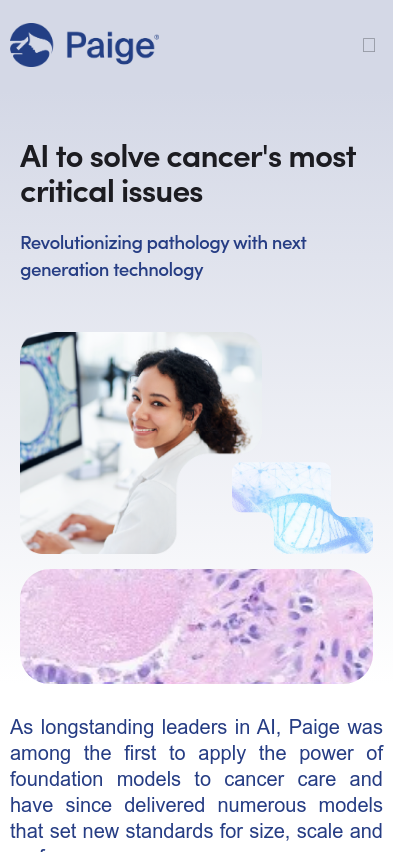
Paige.ai utilizes AI for cancer diagnosis assistance, supported by a board including professionals from top medical institutions.
Paige AI focuses on revolutionizing pathology through advanced artificial intelligence technology. Their key emphasis is on applying AI to address critical issues in cancer detection, subtyping, and molecular biomarker discovery. This strategic application of AI aims to enhance cancer care, optimize the diagnostic workflow in pathology, and alleviate the workload of pathologists.
Unique Value Proposition and Strategic Advantage:
-
Foundation Models and AI Modules: Paige leverages foundation models and AI modules to accelerate the development of computational pathology solutions that set standards for scale and performance. These models are designed to reduce the time and resources associated with developing AI applications, enabling their customers to achieve advanced AI capabilities without task-specific training.
-
Tissue-Based AI Applications: Paige provides AI-assisted applications designed to support cancer detection and diagnosis directly from tissue samples. This includes identifying molecular biomarkers from these samples, offering a more integrated approach to cancer diagnosis.
-
Comprehensive Suites: Paige offers comprehensive applications for specific cancer types such as prostate, breast, colon, and pan-cancer, each developed with extensive data inputs to increase accuracy and efficiency in diagnosing various cancer conditions.
Delivery on Their Value Proposition:
-
AI-Assisted Diagnostic Tools: Paige offers a suite of AI applications for different cancer types—these include the Paige Prostate, Breast, Colon, and PanCancer Suites—which analyze whole-slide images to assist pathologists in detecting and diagnosing cancer with greater precision.
-
OmniScreen Application: This advanced AI application recognizes phenotypic changes associated with genetic mutations in cancer, allowing clinicians to identify key mutations and pathways critical to cancer progression.
-
Paige Alba™: This multi-modal AI co-pilot integrates cutting-edge AI with voice and text commands to streamline cancer detection and diagnosis processes. By providing real-time insights and optimizing workflows, Alba aims to redefine AI-driven healthcare.
-
Custom AI Model Development: Paige offers licensing opportunities for technology that allows personalized AI models that maintain privacy, security, and clinical standards. These services support developing prognostic or predictive applications, and assist in navigating regulatory challenges and commercialization.
In summary, Paige's strategic advantage lies in its development and application of advanced AI technologies to streamline the cancer diagnostic process and improve clinical outcomes. By offering a combination of AI-assisted tools, foundation models, and customizable services, Paige aims to transform pathology workflows, enhance diagnostic accuracy, and ultimately contribute to better cancer care solutions.
Paige
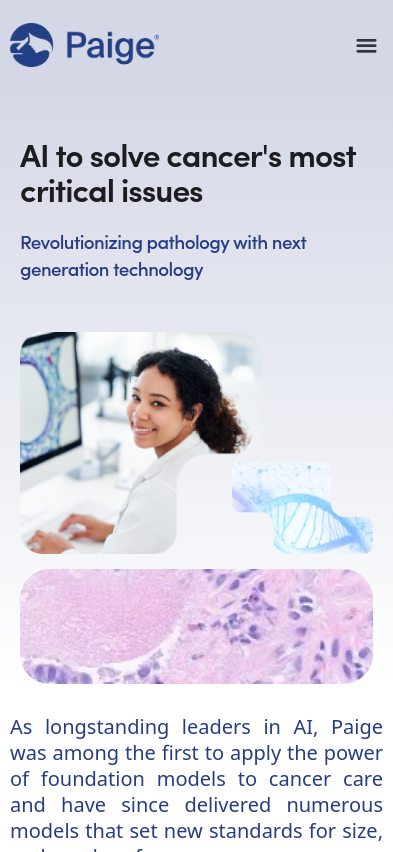
Paige is a diagnostic platform for pathologists, introducing AI to healthcare professionals to improve treatment decisions and was the first company in its sector to receive FDA's breakthrough designation.
Company's Key Focus Area:
Paige AI's primary focus lies in revolutionizing cancer diagnostics through the application of advanced artificial intelligence (AI) technology, specifically in the field of pathology. They aim to address critical issues in cancer care by enhancing diagnostic processes, improving precision oncology, and developing reliable AI solutions that provide insights into the molecular and cellular complexities of cancer.
Unique Value Proposition and Strategic Advantage:
The strategic advantage of Paige lies in their utilization of foundation models for AI, which they claim to have innovatively applied to cancer care. Their unique value proposition is centered around their extensive digital pathology datasets, including over 25 million digitized pathology slides, which purportedly provide a comprehensive understanding of cancer for better diagnostic outcomes. The company emphasizes diversity in its datasets, allowing for a broad spectrum of cancer types across various demographic parameters, which they suggest leads to enhanced precision in diagnostics.
How They Deliver on Their Value Proposition:
Paige AI delivers on their value proposition through several key mechanisms:
-
AI-Assisted Diagnostic Applications: Paige has developed a suite of AI applications to support the detection and diagnosis of various cancers on whole-slide images from biopsies. This includes specialized modules like the Paige Prostate, Breast, Colon, and PanCancer Suites, each designed to aid pathologists in identifying and classifying specific cancer types.
-
Molecular Biomarker Discovery: By leveraging AI technology and next-generation sequencing data, Paige OmniScreen™ aims to identify genetic alterations and biomarkers critical for cancer progression, supporting molecular biomarker discovery directly from tissue samples.
-
Paige Alba™: This is a proprietary multi-modal AI co-pilot designed to enhance pathology workflows and precision medicine. It integrates AI insights with workflow automation, intended to streamline pathologists' diagnostics processes.
-
Foundation Models and Technology Services: Paige claims to offer licensing for their advanced AI technology which can be customized for development by third parties. Their foundation models reportedly eliminate the need for task-specific training, purportedly optimizing resources and enabling novel computational pathology applications.
-
Regulatory and Commercialization Support: The company provides services that encompass regulatory strategy and commercialization support, intended to help partners navigate the regulatory landscape and efficiently deliver new technology to market.
In summary, through their suite of AI-assisted tools and foundation models, Paige intends to support precision diagnostics and relieve pathologists of some manual burdens, purportedly allowing for more informed and efficient clinical decisions in cancer care. However, while their claims highlight several innovative approaches and technological advancements, it is crucial to align these stated capabilities with validated outcomes or independent assessments for a clearer understanding of their impact in practice.
Huma.AI
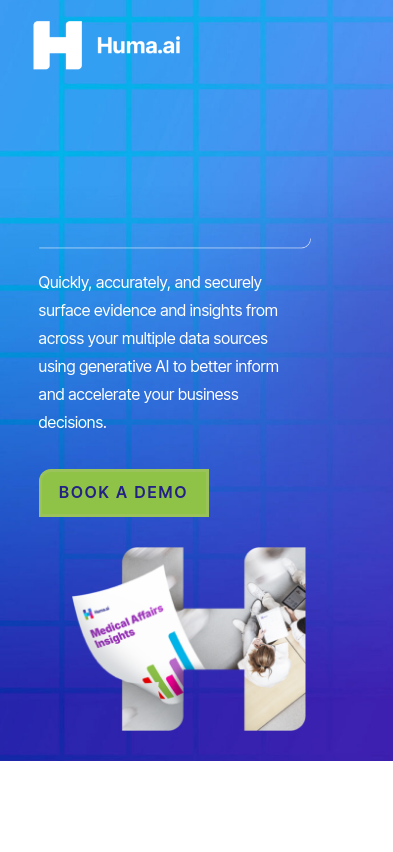
Huma.AI is a leading generative AI platform for life sciences, providing advanced insights and data-driven solutions to accelerate drug development and improve healthcare outcomes.
Huma.AI Overview: Key Insights for Executive Audience
1. Company's Key Focus Area: Huma.AI is centered on empowering the healthcare and life sciences sectors by accelerating decision-making processes. They achieve this through their generative AI platform, designed to extract, synthesize, and process data and insights from a wide range of complex data sources. Their primary goal is to streamline the analysis of clinical evidence, market trends, and internal research to aid in strategic business decision-making.
2. Unique Value Proposition and Strategic Advantage:
-
Generative AI Application: Huma.AI differentiates itself by harnessing generative AI technology to simplify the extraction and synthesis of insights from large volumes of data. This capability enables users to construct a comprehensive and tailored view of their data landscape, optimizing the decision-making process.
-
Single-Tenant Environment: Each client is provided a dedicated environment for their data, ensuring confidentiality and protection, which can be critical in sectors handling sensitive health data.
-
Automated Insight Generation: The platform’s automation reduces the time required for insight generation from days or weeks to minutes. This enhances agility and responsiveness to evolving market and scientific landscapes.
3. How They Deliver Their Value Proposition:
-
Diverse Functional Modules: Huma.AI provides various modules such as literature review, congress materials analysis, CRM data consolidation, market research, research study ingestion, and ad board feedback tracking. These tools are designed to tackle different aspects of data analysis and insight generation, specific to the needs of healthcare and life sciences.
-
User-Friendly Interface: Through an interface that supports everyday language queries, the platform facilitates rapid access to information, allowing users to ask questions and receive fast, relevant answers.
-
Robust Security Measures: The company maintains stringent security protocols, adhering to SOC 2 Trust Service principles, utilizing AWS infrastructure for encrypted data storage and transmission, and routine security reviews to uphold data integrity and confidentiality.
-
Comprehensive Data Handling: Capabilities include the ingestion of public and private data, advanced real-time data analysis, and seamless data export, fostering collaborative insights within teams.
Huma.AI positions itself as a strategic partner in enhancing efficiency and productivity in decision-making processes for its clients in healthcare and life sciences, leveraging cutting-edge AI technology to transform data into actionable insights.
Verta.ai
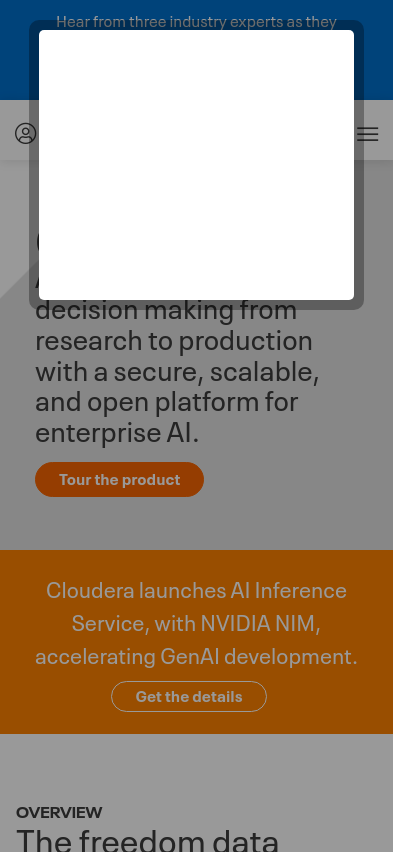
Verta.ai focuses on ML model management, offering a platform for model version management and production launching. Founded by Dr. Manasi Vartak, based on MIT CSAIL research.
DEI | About | About | News | About | Locations | Contact | Contact | Careers | Leadership | About | About | About
Executive Summary of Cloudera's Positioning and Offerings
1) Key Focus Area: Cloudera concentrates on providing enterprise-level data solutions that integrate AI and machine learning (ML). Their focus is on assisting organizations to derive business insights from their data through a hybrid data platform. This platform supports modern data architectures by blending capabilities across data engineering, AI, machine learning, and analytics.
2) Unique Value Proposition and Strategic Advantage: Cloudera’s unique value proposition lies in its hybrid data management platform that facilitates extensive scalability and agile data processing across various infrastructures—cloud or on-premises. Specifically, Cloudera emphasizes:
- Hybrid Data Platform: It is branded as the only hybrid data solution for modern data architectures, enabling organizations to manage data anywhere while leveraging enterprise AI.
- AI Inference Services: The platform enhances generative AI (GenAI) development capabilities, displaying an edge in AI model deployment and lifecycle management.
Strategically, Cloudera stands out by offering:
- Comprehensive MLOps Tools: These facilitate continuous model management and lifecycle governance ensuring AI models remain accurate and secure.
- Extended SDX (Shared Data Experience): Offers unified governance for data and models, enabling transparency and automation in data operations.
3) Delivery on the Value Proposition: To deliver its strategic offerings, Cloudera has developed several solutions and products aimed at various data and IT leaders, data practitioners, and across multiple sectors such as finance, technology, healthcare, and more.
Key aspects of delivery include:
- Platform Features: Cloudera provides containerized workspaces with automated compute resource allocation, enabling seamless model training, deployment, and inference.
- Data Science Tools: The platform includes exploratory data science capabilities and Accelerators for ML Projects (AMPs), allowing for rapid and reusable AI application development.
- MLOps and Workflow Integration: Users benefit from integrated environments with workspaces facilitating model deployment, data visualization, and insights delivery through intuitive interfaces.
- Deployment Flexibility: Cloudera AI can be deployed across cloud and on-premises infrastructures, emphasizing a cloud-native, portable experience that screens against vendor lock-in through multi-cloud readiness.
In summary, Cloudera offers a comprehensive platform for organizations to advance their data-driven initiatives through innovative data management and AI technology solutions. These solutions are designed to not only optimize existing data practices but also scale with future technological advancements. The strategic focus on hybrid and scalable solutions provides a notable edge amidst competitive data and AI landscape—aiding businesses to streamline their data science operations and accelerate AI adoption.
Artera

Artera is a leading precision medicine company developing AI tests to personalize therapy for cancer patients. Their test provides risk stratification and prediction of therapeutic benefit.
Artera's Business Focus and Offerings
Artera specializes in precision medicine, with a focus on developing artificial intelligence (AI) tools to advance personalized cancer therapy. Their key product, the ArteraAI Prostate Test, is aimed at assisting clinicians and patients in making informed treatment decisions for localized prostate cancer by predicting patient-specific therapeutic benefits and long-term outcomes through the analysis of digital pathology images and clinical data.
Unique Value Proposition and Strategic Advantage
Artera's unique value proposition lies in its multimodal AI approach, which integrates digital pathology with clinical data to predict personalized treatment outcomes without requiring additional tissue samples. Artera states that their test is the first AI-based tool for prostate cancer to be recommended in the National Comprehensive Cancer Network (NCCN) guidelines, underscoring its clinical credibility.
They offer the following strategic advantages:
-
Personalization: The ability to tailor cancer treatment plans to the individual patient based on predictive and prognostic biomarker tests.
-
Diversity and Inclusivity: The AI models have been developed with a significant representation of African American patient data, addressing key health disparities in prostate cancer treatment.
-
Non-Invasive Testing: By using existing biopsy slides without consuming tissue, the test allows for rapid results within approximately 2-3 days, reducing the waiting period compared to traditional methods.
Delivery of Value Proposition
Artera delivers its value proposition through several mechanisms:
-
AI Technology: Their AI platform analyzes multiple patient-specific characteristics derived from digital pathology and clinical data and helps stratify patients based on predicted treatment benefits.
-
Clinical Integration: The AI-driven results support decision-making by providing data that clinicians and patients can use to collaboratively decide on personalized treatment plans.
-
Validated Framework: The ArteraAI Prostate Test has been validated through multiple Phase 3 clinical trials, boasting robustness and reliability.
-
Regulatory and Payment Pathways: The test is included in established prostate cancer guidelines and has obtained Medicare payment rates, potentially facilitating wider clinical adoption.
Artera strives to incorporate its AI solutions into clinical practice, enhancing decision-making and treatment efficacy for prostate cancer patients. By emphasizing rapid results and personalized care, they align closely with contemporary demands for precision medicine in cancer care.
Persana AI

Persana AI offers an AI-powered prospecting platform that automates go-to-market activities through AI agents and multi-source data integration. Provides features like real-time data integration.
About | Contact | News | About | About | About | Contact | Contact | Contact | Contact | About | About | About | About | About | About | About | Leadership | About | About | About | About | About | About | About | About | About | About | About | About | About | About | About | About
Key Focus area:
Persana primarily focuses on revolutionizing the traditional sales process through the use of AI-driven automation. Their core solution involves deploying AI agents that manage sales development tasks 24/7, highlighting the inefficiencies of traditional sales methods and offering automated, continuous operation as the solution. They propose that these AI-powered teams can significantly increase a company's ability to manage leads and optimize revenue operations.
Unique Value Proposition and Strategic Advantage:
The unique value proposition of Persana lies in its AI-driven sales automation platform, which is marketed as capable of operating nonstop without missing leads or opportunities. The strategic advantage is their claim to possess the "world’s best" data integration through access to over 75 data sources, covering 200 million companies and 700 million contacts for expansive and precise lead identification. This vast data access enables Persana to provide pinpoint prospecting and hyper-personalization at scale, purportedly surpassing competitors like Apollo and ZoomInfo in data relevance and accuracy.
Delivery on Value Proposition:
Persana delivers on its value proposition through several key actions:
-
AI Agents: Offering AI agents named "Perry," "Nia," and "Alex," each tailored to different aspects of the sales process. Perry is an inbound expert designed to enhance lead conversion around the clock. Nia focuses on outbound sales growth and prospect engagement through multi-channel strategies. Alex optimizes revenue operations by tracking key signals from potential companies and automating workflow integrations.
-
Automation and Integration: The platform automates outreach and engagement through multiple channels like email, LinkedIn, text, and phone, claiming the ability to deliver personalized messages tailored to each prospect’s needs. Integration with tools such as Salesforce and HubSpot enhances its offerings, enabling seamless data sync and automation of complex workflows.
-
Data Utilization: Persana uses advanced data enrichment processes to provide detailed insights into customer profiles and market conditions, including alerts for job changes, company funding updates, and hiring trends. This intelligence is utilized to maintain relevant contact for sales teams.
-
Comprehensive Pricing Plans: By offering transparent and tiered pricing plans, Persana caters to different business sizes, ensuring accessibility to core functionalities while promoting scalability with more comprehensive plans for growing teams. They emphasize affordability by aggregating access to over 75 data sources at a lower collective cost.
In essence, Persana positions itself as a comprehensive sales solution aimed at converting leads and closing deals efficiently through data-driven automation and AI, claiming to optimize the sales process and contribute substantively to revenue growth. However, potential clients should consider verifying these benefits, as the content intends to provide an optimistic portrayal of capabilities, highlighting perfect accuracy and automation, which should be critically assessed against actual performance.
Vectra
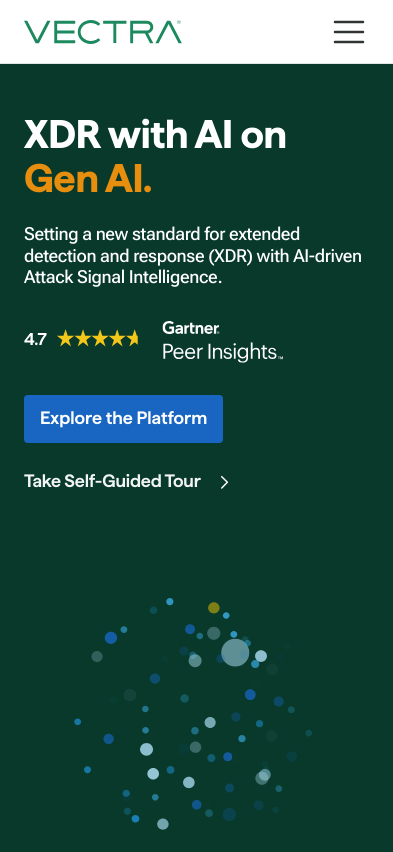
Vectra AI specializes in AI-powered threat detection and response solutions aimed at enterprise cybersecurity across various environments.
- Key Focus Area
The company's key area is cybersecurity, specifically specializing in detecting and responding to sophisticated cyber threats across hybrid cloud networks. They emphasize using AI-driven detection and response solutions for a comprehensive defense against various types of cyber attacks, including those targeting telecom infrastructure. Their platform provides coverage for different environments like public cloud, SaaS, network, and identity systems.
- Unique Value Proposition and Strategic Advantage
Vectra AI's strategic advantage lies in its AI-driven "Attack Signal Intelligence," which is designed to deliver accurate, real-time detection of security threats while minimizing alert noise that can overwhelm security operations centers (SOCs). This unique intelligence is positioned as being capable of finding advanced threats that other solutions may miss. Furthermore, the platform supports context-enriched analytics and integrates with various security tools to streamline threat detection and response processes across diverse attack surfaces. Their extensive use of AI and machine learning enhances the ability to monitor behaviors and provide clarity in identity-based threats.
- Delivery on their Value Proposition
-
AI-Driven Detection: Vectra AI's products leverage AI, with over 150 behavior-based detection models for monitoring activities across networks and identifying potential security breaches in real time. This includes detecting behaviors even within encrypted traffic without needing decryption.
-
Integrated Security Solutions: Their platform integrates multiple security functions on a single interface, reducing detection latency and providing comprehensive network coverage.
-
Customizable and Scalable: Their solutions are designed to be flexible, allowing integration with existing security systems through open architectures, which enables organizations to tailor their cybersecurity measures according to specific needs.
-
Reduced Analyst Workload: By employing AI to handle initial threat sorting and prioritization, Vectra AI reduces the alert burden on SOC teams, allowing analysts to concentrate on significant threats more effectively.
-
Managed Detection and Response Services: They offer Managed Detection and Response (MDR) services to help organizations that may lack the internal resources to maintain a round-the-clock security posture. This service helps augment existing security teams with Vectra AI's expertise.
-
Focus on Emerging Threats: Strategic efforts include solutions for modern challenges such as identity protection, ransomware, and supply chain attacks, indicating their focus on evolving threat landscapes.
Overall, Vectra AI positions itself as a proactive solution for organizations aiming to preemptively manage their cybersecurity risks with the help of innovative AI technologies, particularly those dealing with complex, hybrid environments. They claim their systems are scalable, adaptable, and provide a strategic advantage in detecting and nullifying threats early in their progression.
Thoras.ai

Thoras.ai is involved in a $5 million seed funding round.
Thoras.ai Summary
Key Focus Area: Thoras.ai positions itself at the intersection of artificial intelligence and cloud optimization, focusing extensively on adaptive reliability and resource optimization. The company's core initiatives revolve around leveraging ML-based technology to enhance system reliability and efficiency, primarily within Kubernetes environments. Thoras targets downtime prevention and resource allocation by predicting system demands and adjusting scalability to ensure optimal performance.
Unique Value Proposition and Strategic Advantage: Thoras.ai distinguishes itself with its claim of achieving near-perfect system availability—99.999%—through its proprietary ML-enhanced platform. The company's tools attempt to set a benchmark in observability by removing dependency on manual analysis and instead using adaptive ML reasoning to:
- Detect early symptoms to avert downtime, enhancing operational continuity.
- Analyze the root causes of system issues and their impacts on service health.
- Anticipate service demand changes, allowing for predictive scaling.
A significant promise includes 40-60% savings in cloud and observability costs, suggesting a compelling financial incentive for potential clients looking to optimize resource usage while minimizing expenses.
Delivery on Value Proposition: Thoras.ai articulates a multi-functional strategy to execute its value proposition, encompassing:
- Anomaly Detection and Downtime Prevention: Early detection systems are integral to preventing service interruptions by pre-emptively addressing potential disruptions.
- Predictive Scaling: By forecasting demand surges and declines, Thoras enables proactive capacity adjustments that strive to maintain consistent performance and avert resource wastage.
- Resource Allocation Optimization: Thoras’s platform personalizes resource predictions based on the specific requirements of each service, promoting efficiency and reducing over-provisioning.
- Root Cause Analysis & Blast Radius: This feature endeavors to trace and understand the cause-and-effect relationships within system changes, facilitating quicker problem resolution.
- Fault Prevention: A fail-safe monitoring mechanism is utilized to handle unpredictability in system loads and minimize the risk of unscheduled downtimes.
By embedding these technologies into its offering, Thoras aims to enhance operational resilience and B2B service reliability, appealing to businesses driven by data-dependent operations demanding consistent uptime and efficiency.
Customer Engagement and Support: The platform’s accessibility is reinforced through structured demo bookings, aiming to demonstrate the optimization potential and educate potential clients on its utility. Furthermore, Thoras maintains engagement via newsletter subscriptions, promising knowledge on cutting-edge AI improvements and Kubernetes optimizations.
In summary, Thoras.ai intends to be a dependable partner for enterprises seeking sophisticated, AI-fueled solutions to reduce cloud expenditure while bolstering system oversight and reliability. However, as with many technology-based claims, end-users should critically evaluate promises of performance and cost savings against practical outcomes.